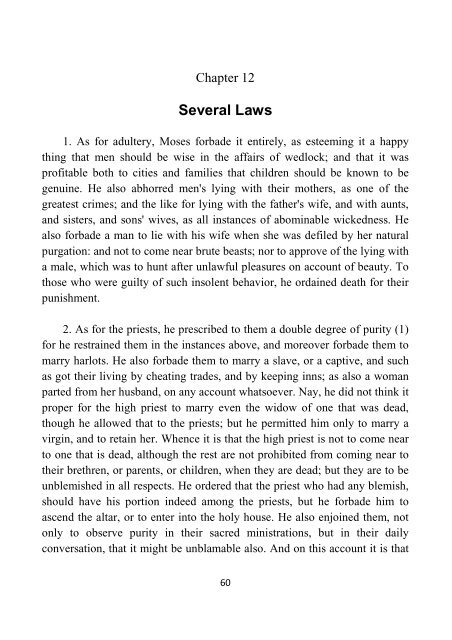From the Exodus Out of Egypt to the Rejection of That Generation - Flavius Josephus
Create successful ePaper yourself
Turn your PDF publications into a flip-book with our unique Google optimized e-Paper software.
Chapter 12<br />
Several Laws<br />
1. As for adultery, Moses forbade it entirely, as esteeming it a happy<br />
thing that men should be wise in <strong>the</strong> affairs <strong>of</strong> wedlock; and that it was<br />
pr<strong>of</strong>itable both <strong>to</strong> cities and families that children should be known <strong>to</strong> be<br />
genuine. He also abhorred men's lying with <strong>the</strong>ir mo<strong>the</strong>rs, as one <strong>of</strong> <strong>the</strong><br />
greatest crimes; and <strong>the</strong> like for lying with <strong>the</strong> fa<strong>the</strong>r's wife, and with aunts,<br />
and sisters, and sons' wives, as all instances <strong>of</strong> abominable wickedness. He<br />
also forbade a man <strong>to</strong> lie with his wife when she was defiled by her natural<br />
purgation: and not <strong>to</strong> come near brute beasts; nor <strong>to</strong> approve <strong>of</strong> <strong>the</strong> lying with<br />
a male, which was <strong>to</strong> hunt after unlawful pleasures on account <strong>of</strong> beauty. To<br />
those who were guilty <strong>of</strong> such insolent behavior, he ordained death for <strong>the</strong>ir<br />
punishment.<br />
2. As for <strong>the</strong> priests, he prescribed <strong>to</strong> <strong>the</strong>m a double degree <strong>of</strong> purity (1)<br />
for he restrained <strong>the</strong>m in <strong>the</strong> instances above, and moreover forbade <strong>the</strong>m <strong>to</strong><br />
marry harlots. He also forbade <strong>the</strong>m <strong>to</strong> marry a slave, or a captive, and such<br />
as got <strong>the</strong>ir living by cheating trades, and by keeping inns; as also a woman<br />
parted from her husband, on any account whatsoever. Nay, he did not think it<br />
proper for <strong>the</strong> high priest <strong>to</strong> marry even <strong>the</strong> widow <strong>of</strong> one that was dead,<br />
though he allowed that <strong>to</strong> <strong>the</strong> priests; but he permitted him only <strong>to</strong> marry a<br />
virgin, and <strong>to</strong> retain her. Whence it is that <strong>the</strong> high priest is not <strong>to</strong> come near<br />
<strong>to</strong> one that is dead, although <strong>the</strong> rest are not prohibited from coming near <strong>to</strong><br />
<strong>the</strong>ir brethren, or parents, or children, when <strong>the</strong>y are dead; but <strong>the</strong>y are <strong>to</strong> be<br />
unblemished in all respects. He ordered that <strong>the</strong> priest who had any blemish,<br />
should have his portion indeed among <strong>the</strong> priests, but he forbade him <strong>to</strong><br />
ascend <strong>the</strong> altar, or <strong>to</strong> enter in<strong>to</strong> <strong>the</strong> holy house. He also enjoined <strong>the</strong>m, not<br />
only <strong>to</strong> observe purity in <strong>the</strong>ir sacred ministrations, but in <strong>the</strong>ir daily<br />
conversation, that it might be unblamable also. And on this account it is that<br />
60

















